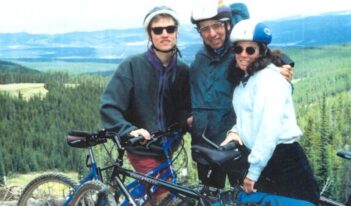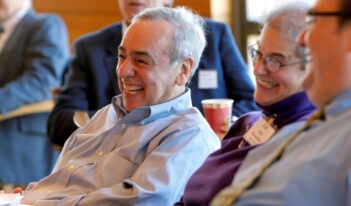
Howard Kunreuther exemplified the virtues of thinking beyond one’s own disciplinary boundaries.
Howard became my Ph.D. adviser at Wharton in 1975 and a dear friend later when we started meeting at his house in Narberth, near Philadelphia, to discuss research. After finishing work, we usually had a light lunch with his wife and then a fierce tennis match at a public court nearby. Being a lefty, Howard had a wicked down-the-the line forehand and played a fine baseline tennis game; he optimally balanced risk and return, even in tennis. He seemed unperturbed by the heuristics and biases that afflict most amateur players. I would characterize our matches as Howard being the constant and me being the variable, with uncertain outcomes as a result.
Thanks to a doctoral seminar that Howard taught on decision making, I read a working paper by Daniel Kahneman and Amos Tversky two years before it was published in Econometrica and became famous. Howard’s graduate course also covered many other crucial behavioral studies about risk taking. This timely exposure to emerging behavioral decision research changed my own Ph.D. trajectory from finance to decision sciences. My Ph.D. thesis on risk-taking, with Howard’s guidance, landed me a faculty position at University of Chicago and its Center for Decision Research. That pioneering center within the business school is presently led by Richard Thaler, who earned a Nobel Prize for behavioral economics, just as Kahneman did a few years early for his remarkable work with Tversky. Howard knew all these gifted scholars personally thanks to his own highly respected research on earthquakes and flood insurance risk plus his very collaborative and positive spirit.
As I got to know Howard better personally, I found him to be an inspiring and enlightening scholar who ventured fearlessly into behavioral research domains well ahead of other, more rationality-oriented scholars. It was one of his special gifts to make personal connections with researchers in diverse disciplines while also engaging with a broad range of practitioners. As an example, when I wanted to expand my doctoral surveys about risk-taking beyond Wharton undergraduates, Howard kindly introduced me to a business contact who ran an insurance agency who generously allowed me to mail my risk survey to all their clients. One finding of this field research was that most clients were over-insured relative to their own stated risk attitudes, affirming the adage that insurance is sold, not bought. But we did not want to shout this from the rooftops, so we just factually reported these results with Howard in the Journal of Risk and Insurance. Wharton professor John Hershey joined our research stream later and helped us publish additional results in Management Science about the limitations of expected utility theory, which at the time was a leading model.
When I later settled at the University of Chicago, Howard and I decided, together with our friend and gifted colleague Paul Kleindorfer, to write a graduate textbook. We aimed to cover the field of decision sciences from four perspectives: individual, group, organizational, and societal. Although it took us way too long to finish the book—ten years in total—we derived much pleasure and intellectual stimulation trying to synthesize the complex emerging decision field from descriptive, normative, and then prescriptive perspectives. I fondly remember our summer rendezvous in Austria in 1982 where Howard was leading a risk analysis group at the International Institute for Applied Systems Analysis (IIASA) examining LNG siting decisions. The institute was housed at Schloss Laxenburg, just outside Vienna, and served as an interdisciplinary academic hub to help foster détente. The institute also had the blessings of the then-U.S. President Ronald Reagan and the emerging Soviet leader Mikhail Gorbachev during a time in which nuclear power and nuclear weapons were core issues of concern. I enjoyed meeting scholars of different stripes and ideologies at IIASA, although I wondered at times whether some Soviet academics there were scholars, spies, both or neither.
Paul Kleindorfer also joined us at IIASA to complete our book as well as to enjoy Vienna, especially since Paul spoke German fluently and I did so decently, due to being Dutch. Howard was by no means intimidated—he just chirped freely along with us in his broken German. As our book took further shape, we tested draft sections and exercises with Wharton undergraduates in Howard’s decision sciences course. Students were invited to examine their own decision making using personal examples that they were dealing with at the time. Some were excellent illustrations of key points in our book and so we added some of these to our last chapter, with their permission. Finally, our book of 470 pages got published by Cambridge Press in 1993. We were fortunate to receive generous book endorsements from such esteemed colleagues as Herbert Simon, Max Bazerman, Baruch Fischhoff, and Ralph Keeney, reflecting Howard’s many deep and personal connections, as well as Paul Kleindorfer’s.
One thing I especially admired about Howard was that he saw new research opportunities in nearly any real-world problem you might pose, which made him an exceptional academic boundary spanner. He was well-read in multiple disciplines, admiring, for example, Mary Douglas’ work on risk in anthropology and Jurgen Habermas’ legitimation views in sociology and philosophy.
I also never detected a hint of intellectual imperialism in Howard about his own academic disciplines being superior to others. He had started his own studies on the rational and quantitative side of the social sciences as an MIT graduate steeped in economics and operations research while working with Ned Bowman. But, over time, he became more behavioral and real world in orientation, which his own doctoral research on using managerial bootstrapping to optimally schedule workers across routine jobs may have foreshadowed.
I consider this behavioral-normative duality in Howard’s research an endearing and important characteristic. His intellectual tolerance and curiosity were well captured in a Festschrift in Howard’s honor in 2010, suitably titled The Irrational Economist, edited by Paul Slovic and Erwann Michel-Kerjan. Many noted scholars contributed chapters, including Nobel laureates George Akerlof, Kenneth Arrow, Tom Schelling, and Robert Shiller, plus luminaries like Colin Camerer, Howard Raffa, Paul Slovic, and Cass Sunstein. Howard himself wrote the closing chapter, in which he reflected on his own career spanning six decades. Howard enjoyed blending behavioral and rational perspectives in his pathbreaking research on decisions about low probability events whose impacts could be enormous for individuals, groups, organizations or societies in general, such as nuclear power.
Although I published just three academic articles with Howard, I cherished each of these greatly as well as our joint graduate-level book with Paul Kleindorfer. Howard exemplified the values of thinking beyond one’s own disciplinary boundaries, remaining open to opposing views from other academic fields, and also fully respecting real-world experiences. I will miss his infectious enthusiasm, spontaneous generosity and gentle soul. To me, and to many others who knew Howard personally, he was an intellectual gem and a very kind human being to boot. I was privileged to have known him as a friend as well as a co-author and a scholar.
This essay is part of a series celebrating the life and scholarship of Howard Kunreuther, titled “Commemorating Howard Kunreuther.”




